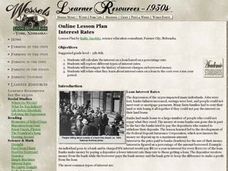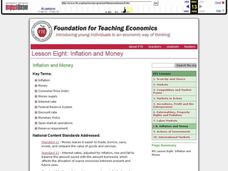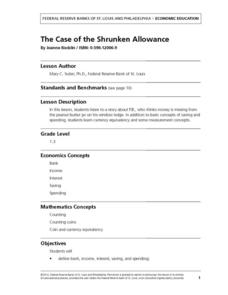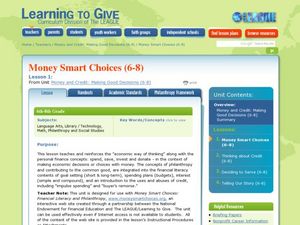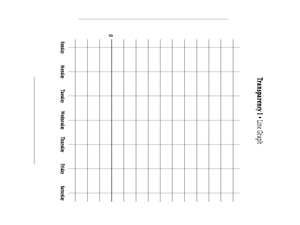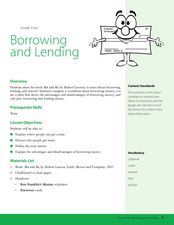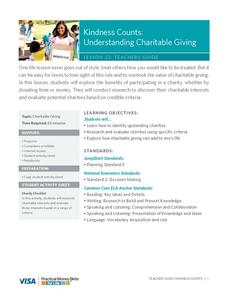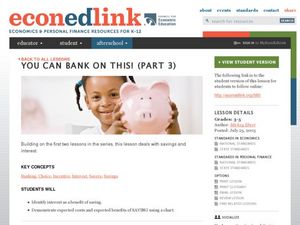Curated OER
Interest Rates
Use a KWL chart and discussion to explore the concept behind loans with interest based on percentage rates. Learners examine different types of interest, the history of interest loans and calculate the costs of a loan over a ten-year...
Curated OER
Inflation and Money
Students examine the relationship between inflation and money. Defining key terms, they define money in terms of its functions and give examples of money. They discover what happens when inflation occurs unexpectedly. They also examine...
Federal Reserve Bank
The Case of the Shrunken Allowance
An allowance is an important thing! Make sure your kids know how to save and spend their own money. Using the book The Case of the Shrunken Allowance as a starting point, this plan covers income, spending and saving, counting, and more.
Curated OER
The Hundred Penny Box
Students compare how people save money in financial institutions, after reading the story, The Hundred Penny Box. They analyze the advantages of regular saving and how savings grow with compounding.
Curated OER
Money and Credit: Making Good Decisions
Middle schoolers participate in activities that teach them how to manage money. In this managing money lesson plan, students set long and short term goals for economic success by having discussions, identifying benefits of saving, and...
Federal Reserve Bank
Less Than Zero
Perry the penguin wants to buy a new scooter, but he doesn't have any funds! Walk your kids through the short book Less Than Zero, and have them track his borrowing, spending, and saving on a line graph while you read. Pupils will learn...
Curated OER
Less Than Zero
Students keep track of money. In this money management lesson, students read Less Than Zero by Stuart J. Murphy and manipulate a number line to keep track of spending and borrowing in the story.
Curated OER
Borrowing and Lending
Fourth graders investigate the advantages and disadvantages of borrowing money. In this financial awareness lesson, 4th graders read the book Ben and Me and create a table displaying the advantages and disadvantages of borrowing money.
Curated OER
Show And Tell
Have you ever saved your money to buy something you really wanted? Elementary schoolers share how they saved their money for things they wanted, and they bring in one or two items that they bought with their personal savings.
Curated OER
Making Money Work For You
Students differentiate between saving and investing money. In this algebra instructional activity, students compare different investment options, recognizing the risks and rewards of investing and integrate investing into their financial...
Curated OER
M&M Interesting
Students examine the concepts of trade-offs and opportunity cost to decide between savings accounts with simple interest and those with compound interest. They calculate interest earned on account balances while working in groups and...
Curated OER
M & M Interesting
Young scholars compute and collect interest payments in the form of M&M candies. In this mathematics instructional activity, students work in small groups to compute either simple or compound interest. They compare the growth of...
Curated OER
Money, Commercial Banking, and Interest
Stdents explore the operation of the commercial banking system and the mechanics of money creation through the lending process. They investigate various interest rates to develop the relationship between interest rates and risk and...
Curated OER
Managing Your Money
Students use the internet to gather information on saving money. They describe the history of money and the responsibilities of the United States Mint. They list their own personal goals and keep a journal as they operate a lemonade...
Curated OER
Children's Literature Across the Curriculum Ideas-If You Made A Million
Students read If You Made A Million by David M. Schwartz. They complete a variety of cross-curricular activities surrounding the study of earning, saving and spending money. Included are reading, art, math, science, writing, social...
Curated OER
Does My hair Disrupt Your Learning?
Students use the internet to research ways to save and earn money. They interview bankers and financial counselors to discover different types of investments. Students create public service announcements to inform their classmates of...
Curated OER
Financial Institution Comparison
Once learners are ready to choose a bank, how do they make a smart decision for their financial needs? Scholars help each other by jigsawing the research in groups. After introducing checking and savings accounts with the attached...
Visa
A Way to Wealth: Understanding Interest and Investments
Money motivates! Help young bankers understand how math plays a part in investing. Give learners math practice while instilling real-world financial literacy skills.
Visa
Kindness Counts: Understanding Charitable Giving
Financial literacy is generally focused on personal spending and saving, but consider an opportunity to talk to your pupils about how charitable giving can also factor into money management and how it can enhance life for both oneself...
Curated OER
The Business of Interest
Learners learn about finance and money management and use math to solve problems, communicate, and explore real life situations as they deal with banks. In this financial management lesson, students apply their math skills to real life...
Federal Reserve Bank
Savvy Savers
What are the benefits and risks of saving in an interest-bearing account? Pupils explore concepts like risk-reward relationship and the rule of 72, as well as practice calculating compound interest, developing important personal finance...
Curated OER
Invest in Yourself
Students develop the concept of finances. In this finance instructional activity, students watch a video called, "Moving Out." Students calculate the finances of a character in the video. Students experience various budget scenarios...
Curated OER
Why Do People Save?
Students identify ways in which they can save and spend their money. They discover why people save money and calculate simple interest. They discuss the costs and benefits of saving.
Council for Economic Education
You Can Bank On This! (Part 3)
Young scholars use a chart to show how gaining interest is a beneficial part of having a savings account. In this banking lesson plan, learners also learn about the workings of an ATM and a checking account.


